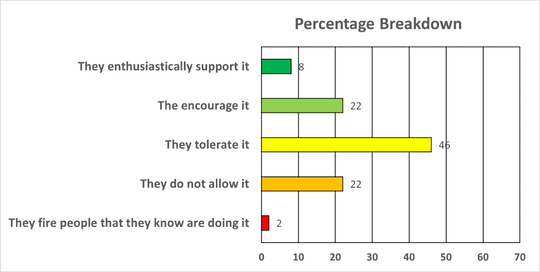
Hybrid entrepreneurship offers inventors and early-stage entrepreneurs an opportunity to kick off their businesses while working full time and keeping their insurance, salary and relationships. Some very successful CEOs started out as hybrid entrepreneurs. An article in World Economic Forum cites Steve Wozniak at Apple, Pierre Omidyar from eBay, and Jack Dorsey at Twitter as a few famous examples.
Hybrid entrepreneurship benefits founders, but what about coworkers and other employers? Do business owners support or want their employees striking out on their own? In a survey I recently finished as part of the Leadership Pulse (a project that started in 2003) we explored this question. A little over 300 managers answered the survey, which closed in July 2023.
The first question we asked was whether respondents’ organizational management teams supported hybrid entrepreneurship. Using a response scale from 1 to 5, where 1 represents leadership that fires people who are doing it, 3 is they tolerate it and 5 is they enthusiastically support it, the average score was 3.12. The bar chart below shows the responses to each answer.

We next asked what percentage of the employee population they thought were practicing hybrid entrepreneurship, and the mean was 19.40; the chart below shows that distribution.

The last quantitative question we asked was “what impact on the day job performance do you see in practicing hybrid entrepreneurship?” The mean for this question response, with 1 being very negative, 3 being neither positive nor negative and 5 being very positive is 3.22. A total of 41% responded positive or very positive; 39% responded with neither positive nor negative, and 20% responded negative or very negative.
What do the numbers tell us?
This quick pulse survey seems to indicate hybrid entrepreneurship is something managers are seeing in their workplace. Opinions show only about 30% of companies are supporting it. In fact, 24% seem to have policies discouraging employees from doing it.
However, the big question is whether hybrid entrepreneurship brings value to an organization. It certainly provides employees with learnings around creating value from a new idea. Given the significant need of most organizations to innovate, one could make a case to encourage this type of experience.
The manager dilemma stems from the worry that employees will spend less time on their day jobs — or worse, that they will be successful and leave. Managers also may be asking whether a hybrid entrepreneur is the type of role model they want in their organizations.
We asked survey respondents to elaborate on their responses via open-ended comments, and below are a few notable pieces of feedback from these managers and senior leaders:
“Within my organization, working on your own is not discouraged. However, this is not generally viewed as something value added to the organization. This is unfortunate, however, just today I spoke to a colleague who does work outside of the organization. He mentioned that his motivation to do so was due to his feeling valued by the organization, however, this motivated him to be successful within his entrepreneurial career.”
“We are all entrepreneurs and we encourage members of the team to pursue outside as well as inside innovation.”
“Jobs have become bigger and more demanding. A side entrepreneurship is highly likely to have a detrimental impact on performance.”
“I think there are benefits to the organization but at the same time it can sometimes distract from company matters so on balance impact is neutral.”
“With hybrid entrepreneurship, productivity has increased as well as performance.”
“The leadership of my organization understands the benefits of hybrid entrepreneurship and fully embraces it.”
“People cannot concentrate on the job in hand if they are trying to build their own businesses. Also there may be a conflict of interest.”
“It encourages employees to perform better”
What are the takeaways?
I reviewed over 200 comments, and only three addressed the key topic that I, as an educator, perceive as bringing so much potential to an organization from hybrid entrepreneurship: hybrid entrepreneurship teaches employees not just how to innovate, but what it takes to do something with big ideas and innovations. The three comments that mentioned learning are below:
“It takes away attention from our business, but the bigger picture is your employee learning skills, improving their happiness, and you will benefit from it that way”
“They may learn new skills but other projects may be a distraction.”
“New skill sets can be learned and implemented across jobs to further development.”
Next steps for business leaders
First, find a way to positively talk about hybrid entrepreneurship with your employees. Then engage in the conversation without punishing in any way the people who admit they are doing this type of work.
Second, think strategically about how embracing hybrid entrepreneurs can help benefit your organization and employees through learning and new skill development.
Third, merge your ideas about hybrid entrepreneurship with your goals about growth and innovation in your organization. Help managers and other leaders in your firm embrace the idea and focus on the positive outcomes to both your employees and to your organization.
There’s a saying that applies to this topic: “This train has left the station.” Peoples’ experiences working at home in recent years have given them the skills to engage in more than one project or job at a time. Employers can embrace these changes or potentially be left behind. If nothing else, start a conversation with your management team about this topic and find out what they think and know about the level of hybrid entrepreneurship in your organization.
Want to learn more? Contact Theresa at tmwelbourne@ua.edu.
